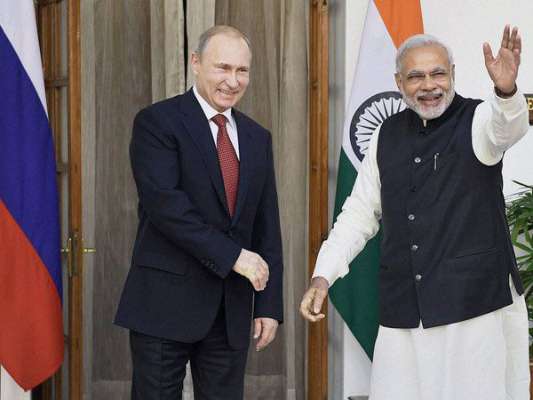It’s time for yet another informal meeting. After his informal talks with Chinese President Xi Jinping in Wuhan city of China on April 27-28, Prime Minister Narendra Modi is now all set to meet Russian President Vladimir Putin for another ‘informal summit’ in the resort town of Sochi in Russia on May 21.
The meeting also comes less than two weeks after US President Donald Trump pulled out of the multilateral nuclear deal on Iran called Joint Comprehensive Plan of Action (JCPOA).
India’s National Security Advisor Ajit Doval was in Moscow for talks in the wake of the US’s pulling out of the deal.
On Monday, May 14, the Ministry of External Affairs confirmed Modi’s visit to Russia in a statement saying it would take place at the “invitation” of Putin.
Modi’s visit would take place at a time when New Delhi’s defence purchase from Moscow could be hit by American sanctions imposed under CAATSA (Countering America’s Adversaries through Sanctions Act), a newly enacted law, a report in the Indian Express said on Tuesday, May 15, pointing out the S-400 missile defence system deal the negotiations over which are said to be in an advanced stage.
The MEA said the meeting would see the two leaders exchange their views on matters of international importance “in a broad and long-term perspective with the objective” to strengthen India and Russia’s “special and privileged strategic partnership”.
Trump’s foreign policy conduct has created such wide reverberations that its enemies and most allies have huddled together to chalk out ways to keep the world safer. European powers like the UK, France, Russia and Germany and Asian powers like China and India have come closer to each other discuss ways to counter Washington’s extreme foreign policy measures – be it protectionism in trade or immigration or pulling out of a crucial deal which promised containment of reckless nuclear ambitions and hence peace.
The trend of having informal meetings side by side formal summits has also become widespread with the US’s growing unpredictable and irresponsible behaviour. The diplomatic surge in the Korean Peninsula where the US has taken an initiative to disarm North Korea though has happened from a positive reasoning, but one never knows which way the tide will turn as long as Trump is in charge of affairs.
The Iran deal has shown it and now, it seems every other key players on the international stage are trying to find an alternative to good relations with the US and it doesn’t matter whether the new found ally is a democracy or a dictatorship. Trump has evolved almost as a common threat to everybody else – directly or indirectly – and this has given rise to diplomacy of a new kind across the table.
India although is not a direct party to the P5 1 deal which former US president Barack Obama and others had made with Iran but the latest crisis on Iran is certainly going to affect New Delhi’s own economic and geostrategic interests centred around Iran. Thus, if PM Modi also shows an intent to discover an alternative group of friends in Russia and China, one wouldn’t be surprised.
Regarding India-Russia relations, although the two countries have been allies over several decades, the change of times has seen India getting closer more to the West than Moscow, resulting in creation of new equations between Russia and Pakistan. But with Trump around, it might not take long for every other line of division to get erased.








